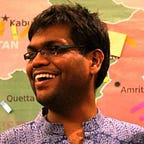The idea of India must be constantly interrogated, not set in stone, to remain meaningful and relevant
(An edited version of this piece was published on firstpost.com on July 16, 2019.)
Buddhists anchor their spiritual practice in the knowledge of dependent arising. It is a way of understanding the world that challenges the existence of a fixed, indestructible ‘self’ separate from the ‘other’. Buddhist teachings about impermanence emphasize that experience of the other is possible only through experience of a self, and that an inability to accept this interdependence causes deep suffering.
I am a novice on this path but I appreciate its wisdom. It helps me think about my experience as an Indian in expansive, fluid and non-traditional ways. This is a precious gift in a world wherein tweeting hot takes is considered a mark of accomplishment. Indian-ness, for me, is not an unchanging essence that I wear on my sleeve. It is a coming together of meanings made intelligible in a particular context.
In the United States, I am the Indian who likes fresh bagels with scallion tofutti. I cringe at the mountains of food that make it to trash. I am the brown guy who asks the black lady on the sidewalk, “Could you please help me make sense of how traffic signals work in this country?” She looks me in the eye, smiles warmly, and says, “Oh honey, that’s easy. Look at the sign. When the white man walks, you walk.” I saunter into museums that advertise free entry. I gawk at rainbow flags on inclusive churches. I sip apple cider, and mingle with friends of friends. I could live here but I’m not sure if the price is worth paying.
In Pakistan, I am the Indian lucky enough to get a visa. I move about with caution. I field uneasy questions about my infamous surname. I gaze in wonder at temples that still survive. I am the vegetarian who does not go hungry. I am the emissary of peace who is showered with more love than one heart can hold. I shed tears over antakshari and midnight kulfi. I pray for better times.
In Nepal, I am the Indian who knows little about the neighbourhood. My currency is welcome but my government is despised. I celebrate my birthday by going to a meditation retreat. I listen carefully to my teachers. I ask lots of questions. I sit in meditation. I walk around the stupa. I weep copiously. I breathe in the mountain air. I make friends with the night sky. All my wishes turn to dust, except for one: enlightenment.
In Afghanistan, I am the Indian who remembers Khuda Gawah and Kabuliwallah. My face lights up when I hear a song from Dilwale Dulhaniya Le Jaayenge playing on the radio. I feast on mulberries and oranges. I marvel at the joy that is as abundant as the sadness. I love the people here but I have renewed appreciation for life back home. I am surprised why Bacha Khan never became part of my history books in the same way that Mohandas Gandhi did.
In Germany, I am the Indian who is bored of bread and cheese. I love these in my own country but can’t bear to have them at every meal. I miss dal chawal and sabzi roti. I am impressed with the efficiency but underwhelmed by the lack of colour. I opt out of evenings at the bar. I love conversation but have better things to do than getting drunk. I look for intimacy on online apps, and I am not disappointed. I go to the Holocaust memorials, and wish India had similar ones for every genocide.
In India, I am the Indian who votes and pays taxes. I am the urban professional who works out of coffee shops, and burns the midnight oil to watch Netflix. I hold an Aadhar card. I speak many languages. English is my source of privilege. Hindi is my connection to my family. I cherish our cultural diversity. I am pained by the hatred that breeds violence. I love the fact that there is wider support for LGBTQ rights. I find it disheartening that Dalits, Muslims and women have to live with fear in their own country.
I am wary of all claims that try to define the idea of India in a manner that is set in stone. It is too complex to be explained away by either the right or the left. For any idea to be relevant and meaningful, it must be continuously interrogated. When we compress reality into an ideological box, we lose the opportunity to see things as they are. We become prisoners of our perspective, and fail to embrace change that is at the very root of existence.
